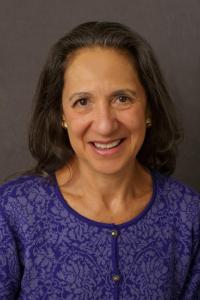Susan F. Steinberg, MD
- Professor of Molecular Pharmacology and Therapeutics

Overview
Academic Appointments
- Professor of Molecular Pharmacology and Therapeutics
Credentials & Experience
Education & Training
- BS, 1972 Biology, Massachusetts Institute of Technology
- MD, 1976 Medicine, Harvard Medical School
- Internship: 1977 Columbia Presbyterian Medical Center, NY
- Residency: 1979 Columbia Presbyterian Medical Center, NY
- Fellowship: 1982 Columbia Presbyterian Medical Center, NY
Committees, Societies, Councils
MEMBERSHIPS IN PROFESSIONAL SOCIETIES:
Diplomat, Internal Medicine, American Board of Internal Medicine
Diplomat, Endocrinology & Metabolic Diseases, American Board of Internal Medicine
American Federation for Clinical Research
American Society for Biochemistry and Molecular Biology
American Society for Pharmacology and Experimental Therapeutics
American Heart Association, Fellow of the Council on Basic Cardiovascular Sciences
Fellow of the International Society for Heart Research (FISHR)
ADVISORY AND EDITORIAL BOARDS:
Member, Program Project Study Section A, USPHS-NHLBI 1992-1996
Molecular Signaling Study Committee, Basic Science Council, American Heart Association 1995-2000
American Heart Association, Northeast Research Consortium Peer Review Group, Cardiovascular Physiol & Pharm, Molecular Biology of Muscle, and Molecular Signaling. 1998-2002
Ad Hoc Reviewer, Cardiovascular and Renal (CVB) Study Section, USPHS-NHLBI 1999
Howard Hughes Medical Institute Research, Medical Student Fellowship Awards Review Panel 1999-2000
Cardiovascular A (CVA) Study Section, Member, USPHS-NHLBI 2000-2004
Chair, NIH Scientific Review Group ZRG1 CVRS-C 02 M, Cardiac Therapies 2010
Program Committee, Basic Science Council, American Heart Association 1994-1997
Abstract Reviewer, American Heart Association Scientific Sessions 1989-2001, 2006-2009, 2011, 2014
Editorial Boards:
Circulation Research 1995-2013
Journal of Cardiovascular Pharmacology 1998-present
Journal of Molecular & Cellular Cardiology 2000-present
American Journal of Physiology 1999-2015
Circulation 2004-2016
Journal of Biological Chemistry 2006-2011
Journal of Cardiovascular Pharmacology, Associate Editor 2008-present
Faculty of 1000, Cardiovascular Physiology 2005-present
Faculty of 1000, Pharmacology & Drug Discovery Advisory Board 2009-present
Columbia University; Department of Medicine, Graduation prizes committee 2002-2004
Molecular Pharmacology Division of ASPET; Secretary-Treasurer 2003-2005
Women in Pharmacology Committee – ASPET 2003-2010
American Heart Association: Chair - Scientific Conference on Molecular Mechanisms of Growth, Death and Regeneration in the Myocardium (with Dr. David Kass) August, 2005
New York Academy of Medicine, Chair, Selection Committee for the Glorney-Raisbeck Fellowship in Cardiovascular Diseases 2005-2008
American Heart Association - Chair Northeast 5B Study Group, Basic Cell and Molecular Biology, Molecular Signaling and Cardiovascular Development April, 2005
American Heart Association, National, Research Committee, Strategic Planning Subcommittee 2005-2008
Chair Stem Cell Task Force 2007-2009
International Society for Heart Failure Research, North American Section Council Member 2006-2012
Nominating Committee for ISHR, North American section officers 2009-2011
North American section program/steering committee 2009-2011
Katz Prize Selection Committee, American Heart Association, Council on Basic Cardiovascular Science 2008-2012
Cardiac Contractility, Hypertrophy, and Failure (CCHF), Study Section, member USPHS-NHLBI 2012-2015
Committee on Appointments and Promotions, Columbia University 2007-2012
Dean’s Committee on Faculty Diversity, Columbia University 2012-present
American Heart Association – Basic Cardiovascular Science Council, Leadership Committee 2014-2018
Columbia University Senate 2016-2018
Honors & Awards
Thomas Smith Memorial Lecture, American Heart Associattion, 2019
Research
The studies in my laboratory aim to identify the mechanisms that underlie the physiologically important changes in cardiomyocyte adrenergic receptor responsiveness that accompany normal cardiac development, that influence the evolution of heart failure, or that contribute to cardiac injury in the setting of ischemia-reperfusion injury and oxidative stress. Our studies take advantage of a wide range of reductionist molecular and cell biological approaches in both cell culture and in vitro models to study the expression and subcellular localization of adrenergic receptor subtypes, to identify the adrenergic receptor binding partners and effectors that dictate signaling specificity in cardiomyocytes, and to understand the molecular basis for catecholamine-dependent cardiomyocyte remodeling. One area of particular interest has been the stimulus- (in some cases redox-) dependent post-translational modifications on signaling kinases such as protein kinase C and protein kinase D that alter their enzymology. We also have identified post-translational processing (involving an O-glycan-regulated proteolytic cleavage) of the beta1-adrenergic receptor N-terminus as a mechanism that calibrates signaling output to downstream effector responses. In both cases, these studies identify novel molecular determinants that can serve as druggable targets.
Selected Publications
Steinberg SF. N-tertaining a new signaling paradigm for the cardiomyocyte β1-adrenergic recepetor. J Cardiovasc Pharmacology (in press) 2022.
Zhu J and Steinberg SF. Trypsin cleavage of the β1-adrenergic receptor. Am J Physiol 322:H486-491, 2022
Zhu J and Steinberg SF. β1-adrenergic receptor N-terminal cleavage by ADAM17; the mechanism for redox-dependent downregulation of cardiomyocyte β 1-adrenergic receptors. J Mol Cell Cardiol 154:70-79, 2021.
Steinberg SF. Decoding the cardiac actions of protein kinase D isoforms. Mol Pharm 100:558-567, 2021
Alter S, Zimmer Ad, Park M, Gong J, Caliebe A, Fölster-Holst R, Torrelo A, Colmenero I, Steinberg SF, Fischer J. Telangiectasia - Ectodermal Dysplasia-Brachydactyly-Cardiac Anomaly-Syndrome is caused by de novo mutations in Protein Kinase D1. Human Genetics 58:415-421, 2021.
Park M and Steinberg SF. Carvedilol prevents redox inactivation of cardiomyocyte β1-adrenergic receptors. JACC: Basic to Translational Science 3:521-532, 2018.
Steinberg SF. Beta1-adrenergic receptor regulation revisited: the role of the extracellular N-terminus. Circ Res Viewpoint 123:1199-1201, 2018.
Steinberg SF. Post-translational modifications at the ATP-positioning G-loop that regulate protein kinase activity. Pharmacologic Research 135:181-187, 2018.
Park M, Reddy GR, Wallukat G, Xiang YK, and Steinberg SF. β1-adrenergic receptor O-glycosylation regulates N-terminal cleavage and signaling responses in cardiomyocytes. Scientific reports 7:7890, 2017.
Gong J and Steinberg SF. Cleavage alters the molecular determinants of protein kinase Cδ catalytic activity. Mol Cell Biol 37:e00324-17, 2017, 2017.
Qi W and Steinberg SF. Phos-tag SDS-PAGE resolves agonist- and isoform-specific activation patterns for PKD2 and PKD3 in cardiomyocytes and cardiac fibroblasts. J Mol Cell Card 99:14-22, 2016.
Gong J, Yao Y, Zhang P, Udayasuryan B, Komissarova E, Zhang F, Chen J Sivaramakrishnan S Van Eyk JE and Steinberg SF. The C2 domain and altered ATP-binding loop phosphorylation at Ser357 mediate the redox-dependent increase in protein kinase C-delta activity. Mol Cell Biol 35:1727-1740, 2015.
For a complete list of publications, please visit PubMed.gov